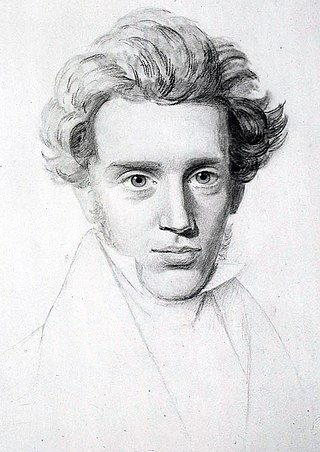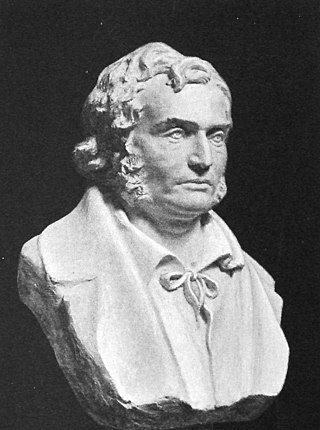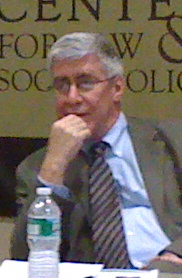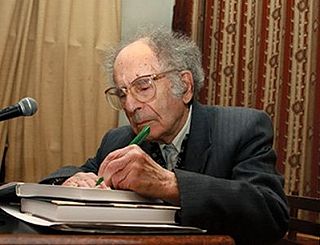Related Research Articles

Jurisprudence, also known as theory of law or philosophy of law, is the examination in a general perspective of what law is and what it ought to be. It investigates issues such as the definition of law; legal validity; legal norms and values; as well as the relationship between law and other fields of study, including economics, ethics, history, sociology, and political philosophy.

Niels Henrik David Bohr was a Danish theoretical physicist who made foundational contributions to understanding atomic structure and quantum theory, for which he received the Nobel Prize in Physics in 1922. Bohr was also a philosopher and a promoter of scientific research.

Søren Aabye Kierkegaard was a Danish theologian, philosopher, poet, social critic, and religious author who is widely considered to be the first Christian existentialist philosopher. He wrote critical texts on organized religion, Christianity, morality, ethics, psychology, and the philosophy of religion, displaying a fondness for metaphor, irony, and parables. Much of his philosophical work deals with the issues of how one lives as a "single individual", giving priority to concrete human reality over abstract thinking and highlighting the importance of personal choice and commitment.

Harald Høffding was a Danish philosopher and theologian.

Poul Martin Møller was a Danish academic, writer, and poet. During his lifetime, he gained renown in Denmark for his poetry. After his death, his posthumously published fiction and philosophical writings were well received. He also devoted several decades of study to classical languages and literature. While serving as a professor at the University of Copenhagen, he was a mentor to the philosopher Søren Kierkegaard.

Ronald Myles Dworkin was an American legal philosopher, jurist, and scholar of United States constitutional law. At the time of his death, he was Frank Henry Sommer Professor of Law and Philosophy at New York University and Professor of Jurisprudence at University College London. Dworkin had taught previously at Yale Law School and the University of Oxford, where he was the Professor of Jurisprudence, successor to philosopher H. L. A. Hart.

Herbert Lionel Adolphus Hart was a British legal philosopher. One of the most influential legal theorists of the 20th century, he was instrumental in the development of the theory of legal positivism, which was popularised by his book, The Concept of Law. Hart's contributions focused on the nature of law, the relationship between law and morality, and the analysis of legal rules and systems, introducing concepts such as the "rule of recognition" that have shaped modern legal thought.

Karl Theodor Jaspers was a German-Swiss psychiatrist and philosopher who had a strong influence on modern theology, psychiatry, and philosophy. His 1913 work General Psychopathology influenced many later diagnostic criteria, and argued for a distinction between "primary" and "secondary" delusions.

Jeremy Waldron is a New Zealand legal philosopher. He holds a University Professorship at the New York University School of Law, is affiliated with the New York University Department of Philosophy, and was formerly the Chichele Professor of Social and Political Theory at All Souls College, Oxford University. Waldron also holds an adjunct professorship at Victoria University of Wellington. Waldron is regarded as one of the world's leading legal and political philosophers.

Louis Dupré was a Belgian-born American religious philosopher, Catholic phenomenologist, and professor emeritus at Yale University. During his lifetime, he authored 15 books, edited four volumes, and wrote more than 400 articles. His most famous works included a highly acclaimed trilogy on the "spiritual sources of modern culture", in which he argued that "the nominalist theology of the late Middle Ages drove a wedge between creator and creation".
The World Congress of Philosophy is a global meeting of philosophers held every five years under the auspices of the International Federation of Philosophical Societies (FISP). First organized in 1900, these events became firmly established after the Second World War. Each World Congress is sponsored by one of the member societies in a different country, which assumes responsibility for the organization of that Congress. The purpose of these events is to contribute to the development of professional relations between philosophers of all countries, promote philosophical education, and contribute to the impact of philosophical knowledge on global problems. The 24th World Congress of Philosophy was held in Beijing in August 2018. The 25th World Congress of Philosophy took place in Rome in August 2024.

Grigory Solomonovich Pomerants was a Russian philosopher and cultural theorist. He is the author of numerous philosophical works that circulated in samizdat and made an impact on the liberal intelligentsia in the 1960s and 1970s.

Søren Kierkegaard was a Danish philosopher whose influence and reception varied widely and may be roughly divided into various chronological periods. Reactions were anything but uniform, and proponents of various ideologies attempted to appropriate his work quite early.
This is a bibliography of works by and about the 19th-century philosopher Søren Kierkegaard.
Jon Stewart is an American philosopher and historian of philosophy. He specializes in 19th century Continental philosophy with an emphasis on the thought of Kierkegaard and Hegel. He has also worked in the field of Scandinavian Studies and has made the culture of the Danish Golden Age better known internationally. Stewart currently works as a researcher at the Institute of Philosophy at the Slovak Academy of Sciences.
2012 in philosophy
The Kierkegaard Circle at Trinity College, University of Toronto, is a philosophical society founded in 1986 whose purpose is to promote the study of the philosophy and theology of Søren Kierkegaard in Canada.
2014 in philosophy
Rae Helen Langton, FBA is an Australian-British professor of philosophy. She is currently the Knightbridge Professor of Philosophy at the University of Cambridge. She has published widely on Immanuel Kant's philosophy, moral philosophy, political philosophy, metaphysics, and feminist philosophy. She is also well known for her work on pornography and objectification.

The New York University Department of Philosophy offers B.A. and Ph.D. degrees in philosophy, as well as a minor in philosophy and a joint major in language and mind with the NYU Departments of Linguistics and Psychology. It is home to the New York Institute of Philosophy, a research center that supports multi-year projects, public lectures, conferences, and workshops in the field, as well as outreach programs to teach New York City high school students interested in philosophy.
References
- ↑ "Philosophy as Inquiry and Way of Life". International Federation of Philosophical Societies. Archived from the original on 10 March 2013. Retrieved 9 January 2013.
- ↑ "University of Copenhagen - SK2013". International Kierkegaard Society. Archived from the original on 31 January 2013. Retrieved 1 February 2013.
- ↑ Hodgson, Godfrey (14 February 2013). "Ronald Dworkin obituary". The Guardian. Retrieved 15 February 2013.
- ↑ Liptak, Adam (14 February 2013). "Ronald Dworkin, Scholar of the Law, Is Dead at 81". The New York Times. Retrieved 15 February 2013.
- ↑ "Philosopher, Cultural Theorist and Human Rights Legend Grigory Pomerants Passes Away". Russkiy Mir Foundation. Archived from the original on 17 April 2013. Retrieved 26 February 2013.